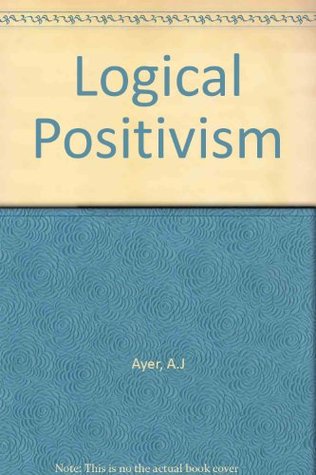Download Logical Positivism (The Library of Philosophical Movements Series) - A.J. Ayer file in PDF
Related searches:
Positivism was a twentieth century attempt to combine empiricism and rationalism. The social sciences and in library and information science (lis).
With the demise of logical positivism it has become fashionable to attack the ideal of scientific objectivity and rationality which they championed as well.
Logical positivists were very interested in clarifying the philosophical significance of the theory of relativity.
Logical positivism, later called logical empiricism, and both of which together are also known as neopositivism, was a movement in western philosophy whose central thesis was the verification principle (also known as the verifiability criterion of meaning).
Developed by the vienna circle during the 1920s and 30s, logical positivism was an attempt to systematize empiricism in light of developments in math and philosophy. The term logical positivism was first used by albert blumberg and herbert feigl in 1931. For logical positivists, the entire discipline of philosophy was centered one task: to clarify the meanings of concepts and ideas.
Logical positivism, also called logical empiricism, a philosophical movement that arose in vienna in the 1920s and was characterized by the view that scientific knowledge is the only kind of factual knowledge and that all traditional metaphysical doctrines are to be rejected as meaningless.
Studies in the origins, development, and influence of logical empiricism.
Logical positivism (later also known as logical empiricism) is a theory in epistemology and logic that developed out of positivism and the early analytic philosophy movement, and which campaigned for a systematic reduction of all human knowledge to logical and scientific foundations.
Also known as logical empiricism, logical positivism may be more broadly defined as a doctrine born of classical empiricism and nineteenth-century positivism and sharpened by an empirical interpretation of the early logical writings of ludwig wittgenstein (1889 – 1951).
Logical positivism emphasizes, empiricism, analysis, and logic. Focuses on epistemology and logic as the only legitimate branches of philosophy.
Title, logical positivism a free press paperback� philosophy volume 2 of library of philosophical movements, issn 0457-7221.
Number of items: alfred cyril ewing (1899-1973) was a british philosopher and a critic of the dominant schools of linguistic philosophy and logical positivism.
Inspire a love of reading with amazon book box for kids discover delightful children's books with amazon book box, a subscription that delivers new books.
Sep 1, 2017 summary logical positivism and the vienna circle are almost synonymous. The vienna circle grew in strength throughout the 1920s, attracting.
This book is an anthology of texts by several authors of logical postivism. Ayer, is a main figure in the contemporary philosophical movement known logical positivism or logical empiricism.
Apr 22, 2020 this article reconstructs the american reception of logical positivism in the early 1930s.
Com: logical positivism (the library of philosophical movements) (9780029011300) and a great selection of similar new, used and collectible books available now at great prices.
According to logical positivism, there are only two sources of knowledge: logical reasoning and empirical experience. The former is analytic a priori, while the latter is synthetic a posteriori; hence synthetic a priori does not exist.
Apr 30, 2010 this volume presents, for the first time in english, many of the most influential papers by leading members of the vienna circle.
Logical positivism was a school of philosophy which developed in austria in the decades between the two world wars. It was initially developed by a group of thinkers who met in vienna and who came.
The linked data service provides access to commonly found standards and vocabularies promulgated by the library of congress. This includes data values and the controlled vocabularies that house them. Datasets available include lcsh, bibframe, lc name authorities, lc classification, marc codes, premis vocabularies, iso language codes, and more.
The most readable presentation of the ideas of logical positivism i have come across is the classic language, truth and logic by ayer, which also is an important text historically since it was largely responsible for the popularization of the ideas of logical positivism to the english speaking world.
Logical positivism is grounded in the belief that scientific knowledge should be accepted as fact, and is the only type of knowledge that means anything.
Logical positivism and the vienna circle are almost synonymous. The vienna circle grew in strength throughout the 1920s, attracting philosophers such as rudolf carnap, friedrich waismann, and otto neurath and mathematicians and scientists such as kurt gödel and hans hahn. It started as an intellectual club (initially known as the ernst mach society), with moritz schlick, professor of philosophy at the university of vienna, as its leading light.

Post Your Comments: